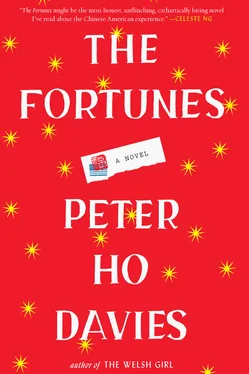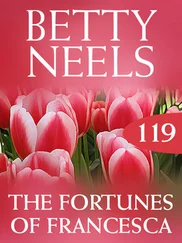“Do you know what you’re going to have?” Norman asked Napoleon. Just like that, John marveled.
She shook her head.
“What are you and your husband hoping for?” Norman pressed, and she blushed.
“Give her a break, Norm,” John said, which was enough to stop the questioning. Norman doesn’t like being called Norm. Norm is the name of a fat man in a bar. Norman is whippet-thin, tall, a cyclist. John pictures him all in Lycra, skinny and tubular as his bike frame. Behind his back the others call him “Normal.” When it thundered one evening they called it a “dark and normy night.” John is responsible for most, if not all, of these lines.
One consequence of the gender imbalance looming in China, John recalls in the bar, is the likelihood of increased prostitution. It’s already happening, if the hotel is anything to go by. After dinner, the long rosewood bar was lined with young women. In Beijing they snaked through the lobby in a loose line, as if on the catwalk at a fashion show—“knockouts in knockoffs,” as Norman put it — heels clicking on the marble floors like beads on an abacus. Now, even though the bar is almost empty, the girls at work somewhere in the hotel, their absence seems to fill it. He watches one of the stragglers close her phone with a snap, sashay toward the elevators in her mini-cheongsam, her stilettos lean as chopsticks. There’s a single girl with a glossy bob left at the end of the bar. He watches her dial, hang up, dial again. He wonders if she was the one who called him. He wonders if he was her first call of the night.
She has set her phone down to take a drink, exchange a few words with the bow-tied bartender. John’s curious if she’ll approach him, feels obscurely rejected that she’s barely cast a glance in his direction. He’s used to a kind of sexual invisibility in the U.S., but here he’s affronted.
He takes out his Little Red Book, reminds himself he’s never been attracted to Chinese girls. He attributes it to being brought up surrounded by images of blondes, Western ideals of beauty. Conditioned. Nola, his “occident waiting to happen,” is all sturdy curves, her milky complexion set off by rosy cheeks (and, to his enduring delight, rosy breasts, rosy thighs, rosy buttocks). By comparison Chinese girls tend to seem, well… girlish to him (their efforts at sexiness a kind of vampish dress-up, not to be taken seriously), if not boyish (slim-hipped and flat-chested, though he’s dimly aware it’s this very quality that makes Chinese men seem effeminate). He considers himself immune to the Western fetish of otherness, even if — perhaps because —his father wasn’t. And yet he envies these girls too, their desirability. He recalls roommates in college extolling the appeal of Asian girls, calling him a lucky dog. But he didn’t feel lucky. White guys chased Asian chicks; white chicks ignored Asian guys. Not for nothing does he jokingly call Nola his trophy wife.
On the plane, looking at the young Chinese stewardesses, so different to the aging attendants on U.S. fleets, he’d tried to picture his mother in her youth. She’d quit her job after she married, and his father had quit long-haul flights, settling for regional routes that meant he could spend two nights out of every three at their new home in Seattle (though he called short-haul trips “milk runs”). John’s mother had told him once that the Captain hadn’t quit sleeping with stewardesses, though. “Sluts of the skies,” she’d told him acridly. In fact, the only time he’d recognized his mother in the Chinese flight attendants was when one of them barked at someone to sit down while they were still taxiing to the gate.
Why aren’t Chinese prostitutes popular with American men? (If only, he thinks reflexively.) Because half an hour later you’re horny again. Was that one of the Captain’s? One of Jordison’s?
He flicks through his Little Red Book to the section on women. “It has become necessary to arouse the great mass of women… to take their place on the labor front.” Mao too? In his head he hears the tinny rimshot of an irony more wearying than jet lag.
He steals a glance at the girl along the bar, as if she’s heard it too, and catches her uncrossing and crossing her long legs on the barstool. He looks away too quickly. Between them the bartender polishes glasses intently, as if he’s trying to will his smudge of downy mustache to thicken.
A memory of Singapore’s strict censorship laws, of a part with the famous bans on gum and long hair, occurs to him. This was back in the late eighties. The movie When Harry Met Sally was out. John had seen it in the States and then flown to Singapore with his mother to visit family during his summer vacation. He’d been homesick, miserable, had jumped at the chance to go see the movie again when a couple of slightly older female cousins — a lawyer and an accountant, though they were both lovely enough to be local news anchors, the acme of Chinese American beauty, back home — had suggested it. The cousins were thrilled that the movie was even being shown in Singapore. Why? John had wondered; it was an innocuous enough flick (wiseass that he was, he liked to say he’d enjoyed it more the first time he’d seen it, when it was called Annie Hall ).
“Because of the orgasm!” one cousin had giggled, covering her mouth, referring to the film’s famous scene in which Meg Ryan noisily and lengthily fakes an orgasm in a deli. “I bet the censors cut it” was the other cousin’s — the lawyer’s — prediction, but lo and behold, when they saw the movie, the scene was still there. Afterward the cousins, while exultant that it had been left in, couldn’t see what all the fuss was about: “It wasn’t even that funny, lah.” John had shrugged, too embarrassed to discuss orgasms with these two beautiful women, at once older and more innocent than he, and yet… he could have sworn the scene was funnier in the U.S., funnier and longer, which meant, he figured later, that the Singaporean censor had decided… what? That faking an orgasm was fine, but for only so long? And what did that say about Chinese women’s orgasms? he reflected. (Knowing at the same time that it surely said as much, if not more, about Chinese, probably male censors.)
The bartender asks if John wants another, and he looks at the girl. I’ll have what she’s having. He’s in a foreign country, after all, freed from the restraints of home. Plus he’s a writer. Everything’s research. Hadn’t Nola told him to write something real? And besides, what can happen? He can hardly take her back to his room. He nods to the bartender and offers to buy the young woman another, sliding down the bar toward her. It’s late enough and he’s self-deluded enough to feel like he’s doing her a favor, as if she’s a wallflower. A couple of days earlier, in Beijing, Napoleon had taken them to a local park and a place called English Corner, where students liked to practice their English with tourists. Only none of them had talked to John; they all clustered around Nola and the others, as if assuming his English must be deficient.
Her name is Pearl, she tells him, with the slightest sigh.
“After the river,” he says, nodding eagerly — tired as he is, his head feels as loose on his neck as a bobble head — but she shakes hers.
“No?”
She giggles, covering her mouth, beckons him closer. He feels her breath against his ear. “Pearl Fuck.”
She giggles again, maybe at his blushing.
“Very… literary,” he tells her.
Up close she’s heavily made up — rouged cheeks, fuchsia eye shadow, colored in as if with crayon. She reminds him of one of Warhol’s Mao s.
She asks him where he wants to go, and he says, “Nowhere. Can we just talk?” She shrugs, makes to move, and he hastens to add, “I’ll pay for your time.” He fears if he goes anywhere private with her he won’t be able to stop himself, and it startles him, this unaccustomed lust for a Chinese woman, makes him consider what else he might be capable of. “You could practice your English.”
Читать дальше












